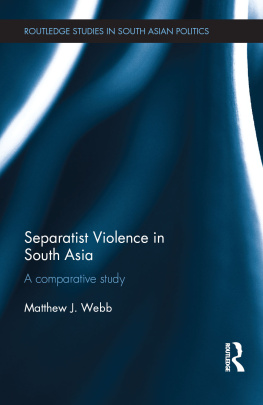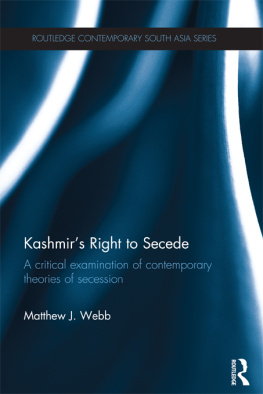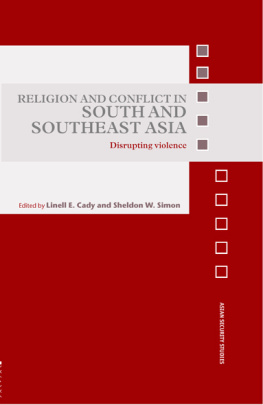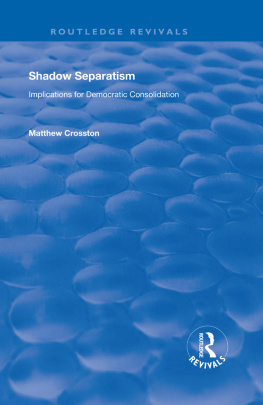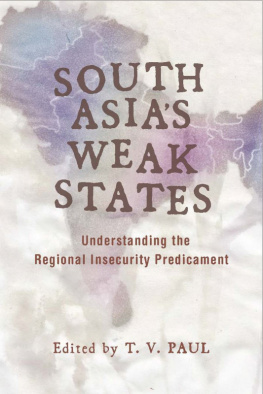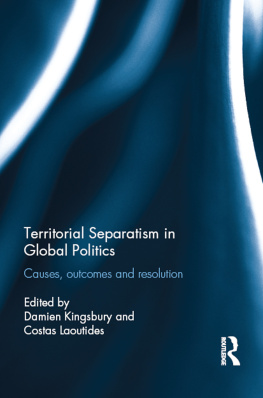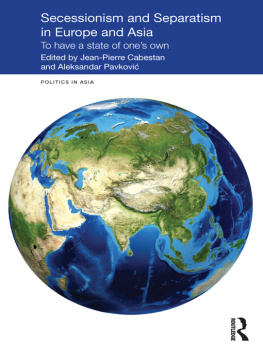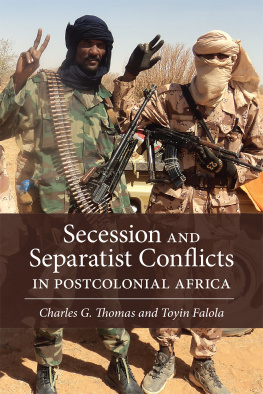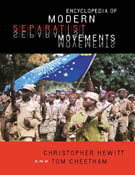Separatist Violence in South Asia
Since decolonization began in the late 1940s, a series of often lengthy and destructive separatist insurgencies have imposed severe financial, economic and human costs upon the states of South Asia. Whereas previous analyses of these conflicts have typically focused upon the parent state or separatist group as the relevant unit of analysis, this book adopts a broader framework, arguing that separatism cannot be understood in isolation from the concept of state sovereignty.
This book explores the motives, tactics, successes and failures of South Asias separatist movements by deconstructing sovereignty into its constituent components and offers an explanation for why separatism, but not political violence, has recently declined in the region. Taking a comparative explanatory viewpoint, it offers a comprehensive review of relevant explanatory theories dominant in the scholarly literature on separatism and an examination of their application to the South Asian states of India, Pakistan, Sri Lanka and Bangladesh.
As a thought-provoking discussion of statehood and sovereignty, this book will be of interest to students of political theory, comparative politics, international relations and South Asian politics.
Matthew J. Webb is Associate Professor of Politics and International Relations at the Petroleum Institute, Abu Dhabi, United Arab Emirates. His previous publications include Kashmirs Right to Secede: A Critical Examination of Contemporary Theories of Secession (2012) and The Political Economy of Conflict in South Asia (2015).
Routledge Studies in South Asian Politics
1 Nepal and the Geo-Strategic Rivalry between China and India
Sanjay Upadhya
2 Security Community in South Asia
Muhammad Shoaib Pervez
3 Refugees and Borders in South Asia
The Great Exodus of 1971
Antara Datta
4 Indias Human Security
Lost Debates, Forgotten People, Intractable Challenges
Edited by Jason Miklian and Ashild Kolas
5 Poverty and Governance in South Asia
Syeda Parnini
6 USPakistan Relations
Pakistans Strategic Choices in the 1990s
Nasra Talat Farooq
7 Public Policy and Governance in Bangladesh
Forty Years of Experience
Nizam Ahmed
8 Separatist Violence in South Asia
A comparative study
Matthew J. Webb
9 Pakistans Democratic Transition
Change and Persistence
Edited by Ishtiaq Ahmad and Adnan Rafiq
Separatist Violence in South Asia
A comparative study
Matthew J. Webb
First published 2017
by Routledge
2 Park Square, Milton Park, Abingdon, Oxon OX14 4RN
and by Routledge
711 Third Avenue, New York, NY 10017
Routledge is an imprint of the Taylor & Francis Group, an informa business
2016 Matthew J. Webb
The right of Matthew J. Webb to be identified as author of this work has been asserted by him in accordance with sections 77 and 78 of the Copyright, Designs and Patents Act 1988.
All rights reserved. No part of this book may be reprinted or reproduced or utilised in any form or by any electronic, mechanical, or other means, now known or hereafter invented, including photocopying and recording, or in any information storage or retrieval system, without permission in writing from the publishers.
Trademark notice: Product or corporate names may be trademarks or registered trademarks, and are used only for identification and explanation without intent to infringe.
British Library Cataloguing in Publication Data
A catalogue record for this book is available from the British Library
Library of Congress Cataloging in Publication Data
A catalog record for this book has been requested
ISBN: 978-1-138-92654-7 (hbk)
ISBN: 978-1-315-67908-2 (ebk)
Typeset in Times New Roman
by Wearset Ltd, Boldon, Tyne and Wear
For Sayuri, Jamie and Mia
Contents
This book was made possible by a research grant from the Petroleum Institute, Abu Dhabi, to whom I would like to express my gratitude. Others who deserve a mention include Wisam Sabeel, who acted as a research assistant in the early stages of the project, and Brian Bielenberg, Hamad Karki and Mark Hayman for their encouragement and support.
This is a book about separatism and, more specifically, the rise of violent separatism in the South Asian states of Pakistan, India, Bangladesh and Sri Lanka. Home to approximately one fifth of the worlds population, these states have faced significant challenges in overcoming the legacy of colonial rule to unite diverse populations under a single national banner since gaining independence. Included within these difficulties have been separatist movements that, rejecting state-sponsored projects of nation building, have violently articulated an alternative construction of political community to challenge the states territorial integrity and ideological foundations. Although only one of these movements that which resulted in the creation of Bangladesh in 1971 has been successful, the number and cumulative cost of separatist movements measured in lives lost, infrastructure destroyed, redirected government spending to less productive sectors, and foregone investment has been an enormous burden that these developing states could ill afford.
Understanding the reasons behind the advent of separatism, and the apparent failure of South Asian states to reconcile territorially concentrated sub-national communities to state-sponsored narratives of national identity, is important to the successful reintegration of these communities within the states institutional fabric. Only by identifying the reasons why these groups failed to buy into the rhetoric of national unity is it possible to construct a consensus around their inclusion. Moreover, understanding how processes of state formation can alienate some communities prompting them to seek alternative jurisdictions of state sovereignty is necessary if South Asian states are to avoid similar problems in their contemporary programs of economic growth and reform. The dramatic increase in population and disposable income of South Asias middle and entrepreneurial classes holds out the promise of a reinvigorated national unity founded upon new economic opportunities that, if not properly managed, could also alienate marginal communities excluded from the benefits of economic development. However, the question of why some groups desire to separate from their parent state is far from a straightforward one. There are some communities whose grievances and marginalization on the states ideological and economic periphery make them ideal candidates for independent statehood, but who do not rebel. In contrast, other groups that apparently have few good reasons to secede (and even less prospect of being successful) decide to do so. These concerns raise the question of to what degree separatism is attributable to political processes, calculations of rational self-interest and other factors amenable to scientific analysis, or emotive and atavistic factors hardwired into groups. Are there identifiable factors that make mobilization behind a separatist agenda probable or feasible?
In order to address these questions, this book adopts a comparative approach in which the major separatist movements in South Asia since decolonization are contrasted with one another in order to identify trends, dis/similarities and other factors pertinent to the origins and trajectory of conflict. In addition to sharing a common objective, separatist groups in South Asia have frequently been contemporaneous with one another and possessed other common characteristics, including a collective identity defined in opposition to that of the states nation-building project; sentiments of economic and political grievance that sustain perceptions of difference and neglect; and the contextualization of these claims within the regional rivalries and superpower politics of South Asia. In addition, the factors associated with separatism in the scholarly literature sentiments of injustice, calculations of self-interest and the development of a separate national identity have all been true of South Asian separatist groups as their ideology, membership and tactics changed over time. This similarity provides sufficient construct equivalence to allow meaningful comparison between the cases included within the book, while also acknowledging pertinent differences that help to explain the diverse trajectories that each of these conflicts has taken.

